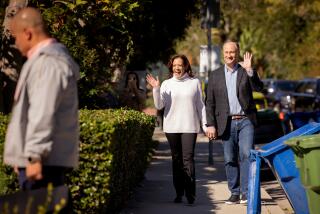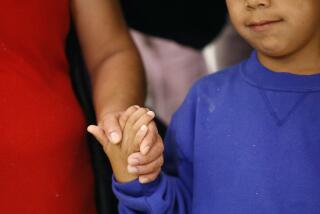A Woman’s Place
It was Karen Hughes who--shortly after the Sept. 11 terrorist attack--wrote into President Bush’s address to a shaken nation that Americans should “live your lives and hug your children.”
But when the most powerful woman to have worked in the White House announced recently that she wanted to do just that--live her life, hug her kid more--it set off a cacophony of interpretation and reinterpretation.
This seemed fitting treatment for Hughes, the chief spinner at the White House, a place where nothing is what it seems. Even the most banal information is packaged to carry a White House message, so what is said is often suspect, and reading between the lines is a favorite Washington pastime.
But then along comes Hughes with a decision that apparently is precisely what she says it is: Her husband and teenage son were “homesick,” so this summer the family is heading back to Texas. Hughes will continue her unique work for Bush--as a confidant, advisor and speechwriter--but she will no longer serve constantly at his side.
A few editorials lauded Hughes’ family-centric decision. Mostly, Washington insiders wondered if there wasn’t some back story--a West Wing intrigue that hadn’t emerged. A Newsweek columnist admonished Hughes, who has worked for Bush through multiple campaigns since 1994, for leaving in wartime: “When private life trumps public service,” the left-leaning columnist wrote, “it’s a sure sign that the post-September 11 call to ‘duty’ is over. Too bad someone forgot to tell the soldiers and their families.”
But outside the Beltway the discussion ranged beyond palace intrigue or mundane questions of whether women could balance career and family life.
This was one of the most powerful unelected women in the United States, and therefore the world, and her willingness to redefine her job became a new benchmark for how much a successful woman could ask of her boss and still maintain her power.
What stunned Ellen Galinsky, president and co-founder of the Manhattan-based nonprofit Families and Work Institute, was that so many people simply concluded Hughes had quit working.
“The fact is Karen is going to continue working, just in a different location for the president,” Galinsky said. “We keep pushing people back into the old boxes--work or family, all or nothing. But none of us really fit that anymore.”
Galinsky and other experts observed that the arc of many successful women’s careers is not predictable--that teenagers test them more often than babies do; that unhappy spouses derail more jobs than demanding bosses or children; that ultimately, most women in these positions manage to wend their way through family/work obstacles--just not always smoothly.
“Every time there is someone this visible who makes such a decision it’s a big stir mostly because people still don’t trust that women can stay in these positions,” said Kay Koplovitz, founder of the USA Network and author of the new book “Bold Women, Big Ideas: Learning to Play the High Risk Entrepreneurial Game.” “But trust me, we will hear more from Karen. She’s very strong, so don’t be surprised if she does something else important.”
For now, Hughes has said she will be returning regularly to Washington to advise the president and will be in touch constantly by phone. Insiders speculate she will also get a contract with the Republican National Committee to start on Bush’s reelection campaign and earn money giving speeches.
Mary Matalin, an advisor to Vice President Dick Cheney, does not see Hughes’ new life as some “big compromise,” but rather as the mother of all work-at-home situations: She gets to continue doing her favorite parts of her job, eliminate what bores her and lead a normal life with her husband and son.
“Karen didn’t care about the power and access thing that is so big in the Washington culture,” Matalin said. “The only thing she liked about her job was [writing] the speeches, the big projects and advising [Bush]. She’ll keep doing all that. What she didn’t like was all the Kabuki dancing in the White House, all of which ate away at her time with her family. And that’s over.”
In the last several months friends and associates could see Hughes was struggling--with long hours counseling a president at war and with a family that was anything but settled. She had confided to people who weren’t even that close to her that her teenage son was angry at her about the move. Unlike the affairs of war and peace, this was a problem Hughes could solve in an instant--and did, on April 21 when she announced she was leaving this summer.
“Throughout my career I have tried to prioritize my family while I have a career,” Hughes, 45, told reporters at a White House press briefing that day. “I’ve prided myself that this is a family-friendly White House, and I think this is a family-friendly decision.”
Bush gave her his blessing saying, “Karen Hughes will be changing her address, but she will still be in my inner circle.”
Whether Hughes’ decision to give up a prestigious title in the interest of her family represents some seismic cultural trend is debatable. But it certainly reveals something about Hughes herself, a loyal and hard-driving professional who set a course for her family that did not altogether pan out.
When the Hugheses moved to Washington in January 2001, they tried to arrange their lives appropriately: They rented a house in McLean, Va., where other Republicans were relocating. They decided Hughes’ husband, Jerry, a semi-retired Austin attorney, would not work. And they enrolled Robert, 15, in a private school in northwest Washington.
The Hugheses chose the St. Alban’s School instead of a nearby public school, largely at the behest of Josh Bolten, a key Bush advisor who had gone there and then to Yale University, like the president and his father before him.
A handwritten letter from Bush helped secure a midyear spot in eighth grade for Robert. And no one could remember his mother--a great admirer of the Bush family--being as happy as she was the day Robert was accepted.
In the ultimate display of domestic role reversal, Jerry Hughes set out to do it all for the family. With his wife off to work at 7 each morning, it was Jerry, now 63, who had to learn the rush-hour shortcuts to the school on the grounds of Washington’s National Cathedral. It was he who had the challenge of figuring out where to buy dog food in bulk for Breeze, their golden retriever, of shopping around for a new church, of spending his days, as he said during an interview last year, “trying to do a little wash, and have a nice meal ready.”
Over the last year, however, the Hugheses had to rethink some of their earlier decisions. They ended up moving--this time to a house closer to Robert’s school. And St. Alban’s, in fact, turned out to be a lot more academically ambitious and socially sophisticated than the suburban Austin public high school where Robert would have gone--and will be going next fall.
“Suddenly [Robert] is catapulted into the world of St. Alban’s, which I would guess for him would be like going to Mars,” Mark McKinnon, the Bush media advisor and close friend of Karen Hughes, told the New York Times.
Like a lot of the White House working parents, Hughes tried to involve her family as much as is possible in her work. More than once, when she had to spend a working weekend with Bush at Camp David, the president invited Jerry and Robert also. Her great innovation to an impossible schedule was to attempt to leave early--at 5:30 p.m. on Wednesdays to get to her son’s ballgames. Often, though, travel abroad and crisis in the White House made that impossible.
Other administration spouses said that during their regular post-Sept. 11 get-togethers, Jerry Hughes did not seem content with the family’s new life. And so with her husband unhappy and her son eager to return to public school in Texas, Hughes began weighing how important her job was to her, according to friends.
“She felt torn because of her responsibility and genuine friendship with the president,” said Matalin, who played the “girlfriend” role, listening over the last months as Hughes worked out her angst over moving back to Texas. “She knows she plays a role larger than her title decries and one that is totally unique to Bush.”
But as a mother of a teenager a few years away from college, Hughes recognized that role, too, was unique and came with equally important responsibilities: “Her husband did the Mr. Mom thing well, but there is only one mother in every family,” Matalin said. “And Karen is talented enough that she could make a decision to enhance her life so that nobody loses.”
As she departs the hothouse on Pennsylvania Avenue there are other high-profile mothers there, who continue to blend work and family life.
Matalin, Margaret Spelling (the domestic policy chief), Lezlee Westine (White House director of public liaison) and others are working the endless day, rolling from crisis to crisis, and attempting to be creative about scheduling their priorities. Matalin frequently brings daughters Matty, 6, and Emma, 4, into the office. Spelling, a mother of two girls, 15 and 10, from Texas, and Westine, a single mother of a 9-year-old girl from California, took their daughters to an ‘N Sync concert last month, and talked business while the girls rocked.
Spelling has also faced similar challenges to Hughes’ over the last year after uprooting her children and a second husband from Texas to live in the nation’s capital.
However, instead of moving her family mid-school year, Spelling commuted every other weekend to Texas until her daughters, who were living with their father, finished in June. That meant for six months she left the White House for Texas early on alternate Fridays and returned late the following Sunday.
It was hard on the family, she says, but during the first months of the administration Spelling, who was then living with her sister in Alexandria, Va., was able to immerse herself in a new job without worrying about her children’s adjustments. Spelling also used spare hours--the few there were--to check out neighborhoods and school districts.
Finally in June, her daughters moved in with her in a rented house near her sister and enrolled in Fairfax County public schools in September. Spelling also remarried over the summer. Her new husband, Robert Spelling, moved up from Texas and opened a branch of his Austin law firm.
Like Hughes, Spelling had to tweak some of her early decisions: She recently transferred her 15-year-old, who was in the same class as Robert Hughes in Austin, from a public to parochial school in Virginia.
“The thing that is so weird about teenagers,” said Spelling, who has been Bush’s chief advisor on education policy, “is that they’re not darn happy about much of anything. You just have to deal with it.”
She has found it helpful having a critical mass of working mothers around the White House who, like her, make a habit of leaving when they need to for their families.
“I give my good 12 to 13 hours a day and get up and just go,” Spelling said. “You get in the fortress mentality so you work straight through, eat a sandwich at your desk, and then leave. This is not graduate school and we’re not students who can stay there all night. We have families.”
There is no doubt in Spelling’s mind that ultimately she and many Texans in the Bush’s administration--such as Bush’s senior political advisor Karl Rove (whose wife quit her job in D.C. to devote her time to the family) and Federal Emergency Management Agency head Joe Albaugh--will gather up their families and follow Hughes back home when their time is up serving this president.
But in the meantime, Spelling, for one, has convinced her family that their stay in the capital is a great adventure as well as a privilege. She has organized several weekend trips--horseback riding on the battlefield at Gettysburg and touring Williamsburg; the Spelling girls have attended concerts at the Kennedy Center and met celebrities such as Olympic champion skater Sarah Hughes at the White House.
“We’re trying to think of this as our year in Provence,” Spelling said, “and make the most of it.”
More to Read
Sign up for Essential California
The most important California stories and recommendations in your inbox every morning.
You may occasionally receive promotional content from the Los Angeles Times.










